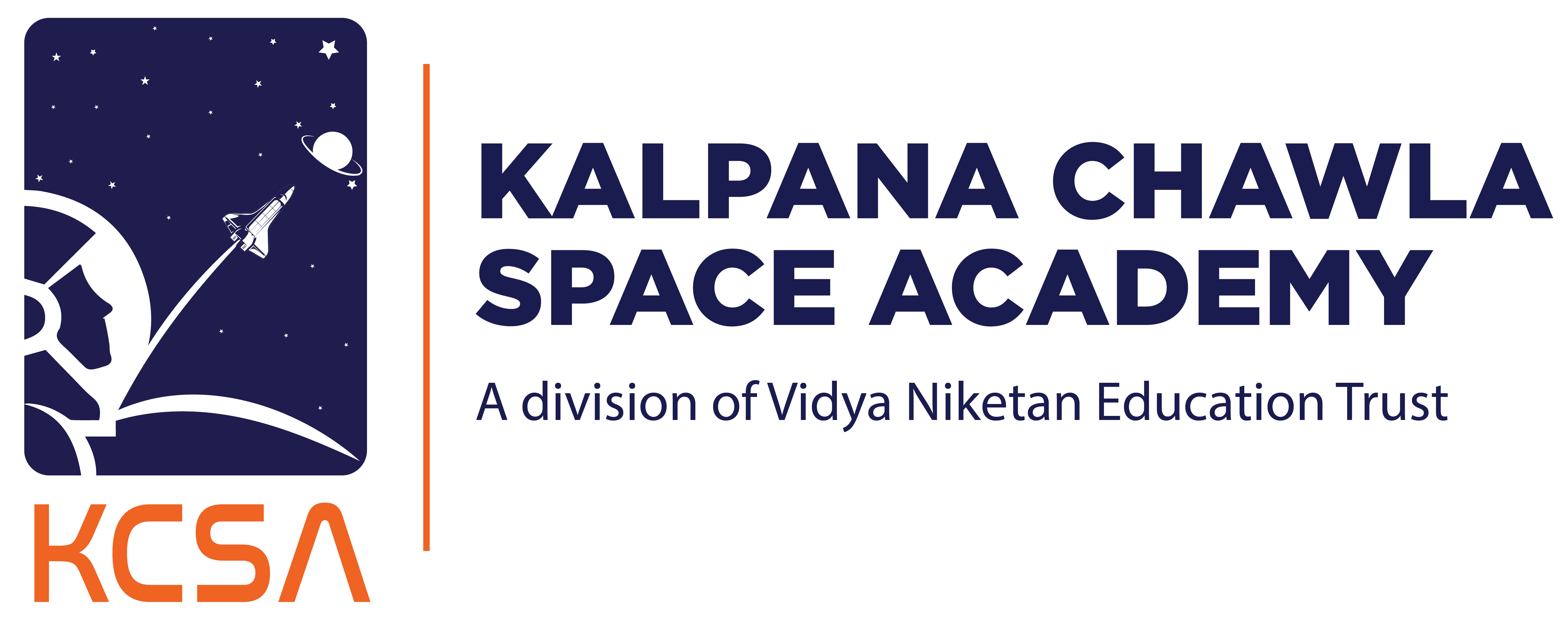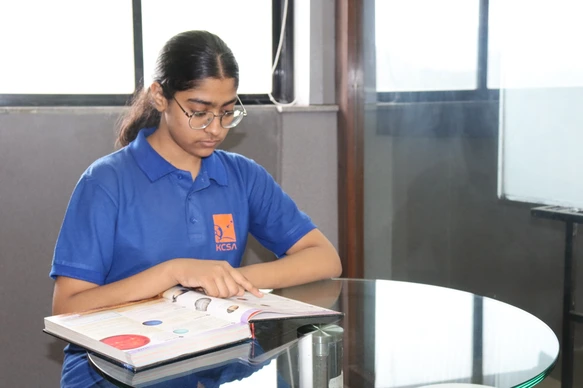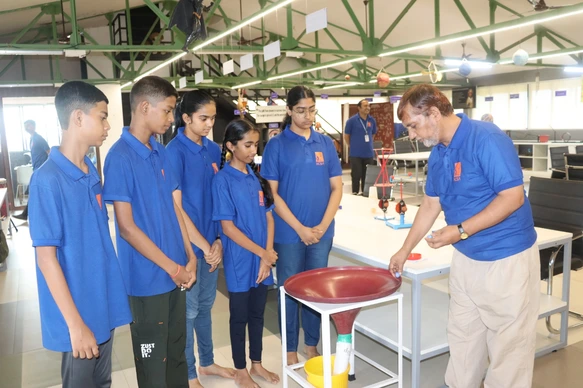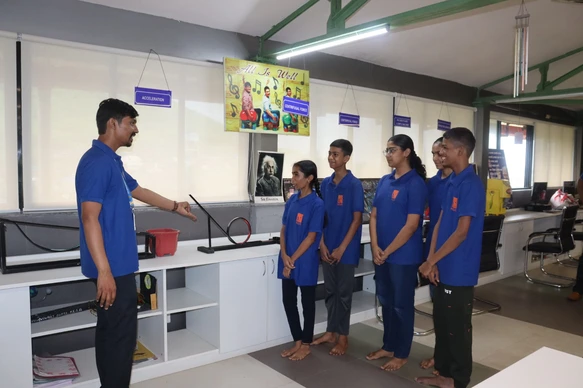Our diverse range of academic programs in science, technology and space studies program is designed to prepare students for success in their chosen fields. From class 7th to 12th programs, we offer rigorous curricula taught by esteemed faculty who are leaders in their disciplines. Our commitment to the future of space exploration ensures that students of KCSA are well-equipped to meet the challenges of today’s global workforce with a scientific mindset.
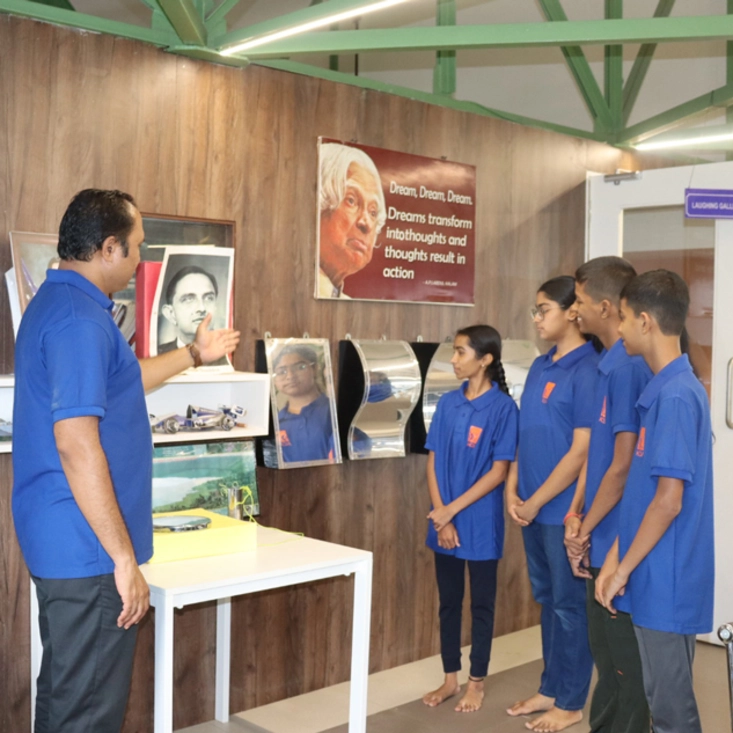
Pedagogy
In a space science school, the pedagogy adopted focuses on fostering a deep understanding of space sciences, technology, and exploration through innovative teaching methods and practical experiences. The carefully curated curriculum at KCSA is focused primarily on learning outcomes. It embodies the core belief of ‘learning by doing.’ Our pedagogy would be in alignment with the current New Education Policy and incorporate any future changes introduced by the government. The activity-based learning is built for experiential learning and improves the learning outcomes. We focus on hands-on training, fieldwork, activity-centric projects, and problem-solving through the application of knowledge. KCSA prioritizes the creative development of your child’s mind along with cognitive enhancements. For this purpose, we introduce the power of storytelling and imagination-stimulating concepts through drama, documentaries, puppetry and films (video analysis) – all of which serve an interactive purpose. We also have E Studio with audio and videos aids for better learning enhancements. Here's an overview of the pedagogical approach typically adopted in a space science school:

Inquiry-Based Learning:
- Exploration and Discovery: Emphasizing hands-on activities, experiments, and projects that encourage students to explore and discover concepts in space sciences.
- Collaborative Learning: Promoting teamwork, communication, and collaboration among students as they work on complex projects.
Project-Based Learning:
- Application of Knowledge: Engaging students in long-term projects that simulate real space missions, integrating multiple disciplines such as physics, mathematics, engineering, and computer science.
- Collaborative Learning: Promoting teamwork, communication, and collaboration among students as they work on complex projects.
Interdisciplinary Approach:
- Integration of STEM: Connecting space sciences with other STEM disciplines (Science, Technology, Engineering, Mathematics) to provide a holistic understanding of space exploration.
- STEAM Integration: Incorporating Arts (design, communication, visualization) into STEM to foster creativity and innovation in designing space missions and technologies
Experiential Learning:
- Hands-On Activities: Utilizing simulations, virtual reality, and field trips to observatories, space agencies, and research institutions to provide practical experiences.
- Laboratory Work: Conducting experiments in dedicated space science laboratories to analyze data, simulate space phenomena, and understand scientific principles.
Technology Integration:
- Use of Space Technologies: Integrating space technologies such as satellites, telescopes, and data analysis tools into curriculum activities and research projects.
- Digital Resources: Leveraging educational software, online databases, and multimedia resources to enhance learning and exploration of space sciences.
Authentic Assessments:
- Performance-Based Assessments: Evaluating student learning through presentations, research papers, project prototypes, and oral examinations related to space science topics.
- Portfolio Assessment: Documenting student progress and achievements in a portfolio that showcases their understanding, skills, and creativity in space sciences.
Mentorship and Expert Guidance:
- Industry Experts: Inviting guest lectures, workshops, and mentorship programs with professionals from space agencies, research institutes, and aerospace industries.
- Faculty Mentorship: Providing personalized guidance and support from experienced faculty members who are experts in space sciences and related fields
Global Perspectives and Collaboration:
- International Programs: Participating in international space science competitions, collaborative research projects, and exchange programs to broaden perspectives and foster global citizenship.
- Cross-Cultural Understanding: Promoting understanding of cultural diversity and global collaboration in space exploration endeavors We give equal importance to the physical and spiritual development of the students. Yoga, meditation and physical activities are part of daily routines of students. Our well-curated Space Library provides exposure to vast topics and comfortable learning environment for our students through books, documentaries and inspiring films.
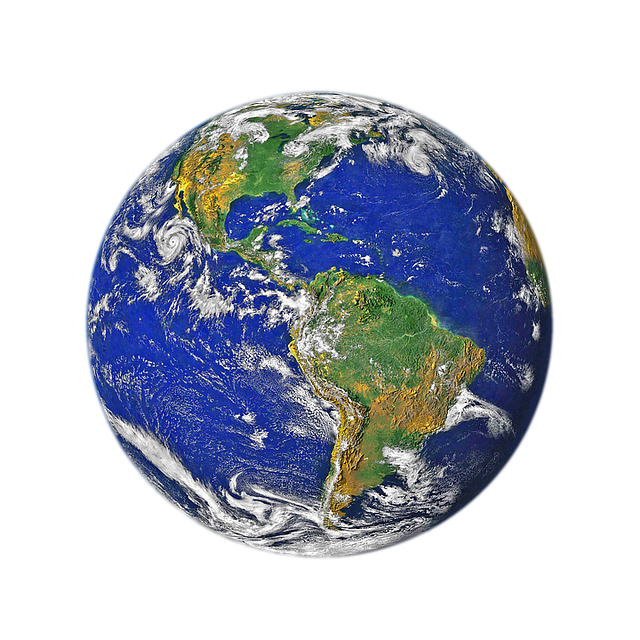
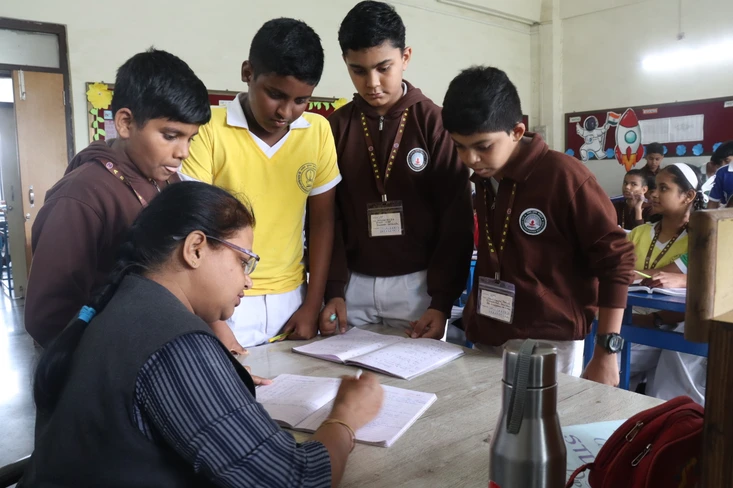
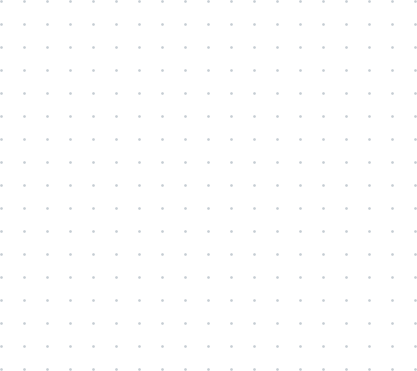
Evaluation & Assessment
We at KCSA have adopted one of the most unique evaluation and assessment metrics, provided to the parents in the form of a Holistic Progress Card, which enriches the learning experience of each student and ensures their comprehensive growth and development.
The Holistic Progress Card comprises a 360-degree multi-dimensional report which differs from a regular academic report card which meticulously documents the advancements and distinctive qualities exhibited by a student.
Incorporating a wide range of continuous assessments, the progress Card includes categories like self-assessment, peer assessment, the child’s progress in ‘project-based’ and ‘inquiry-based’ learning, quizzes, role plays, group work, experiments, and more. Finally, the assessment evaluation by the teacher gives a well-rounded insight into the student’s abilities.
The Progress Card goes hand-in-hand with the periodic Parent-Teacher Meetings, ensuring the active role of parental involvement in the child’s academic development. These meetings foster valuable and insightful discussions that enable the parent to gain awareness of their child’s potential and performance. The Parent-Teacher Meetings additionally enables both, teachers, students, as well as parents to measure learning outcomes and holistic development of the student for an enriching learning path.
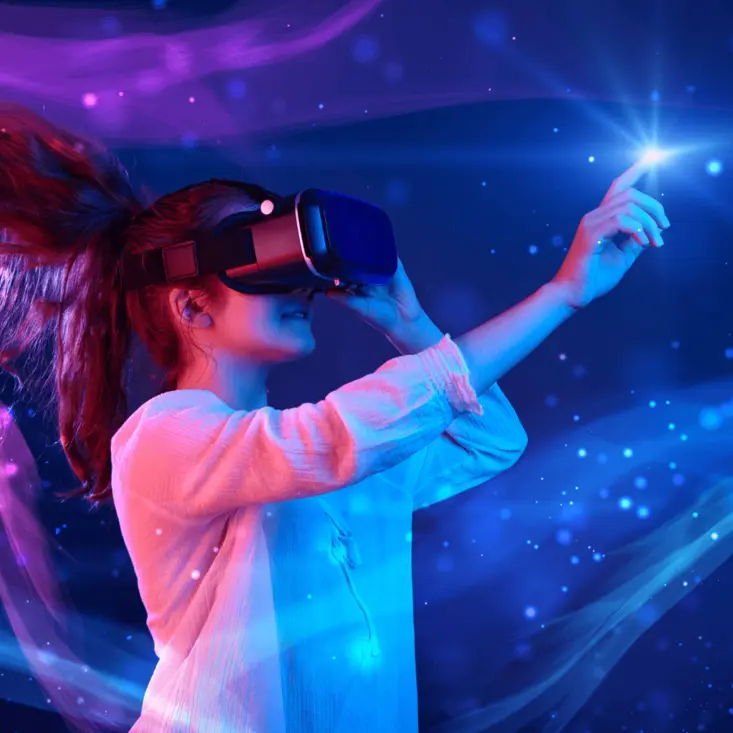
Future Prospects
The students would receive training to cultivate a scientific temperament. They would be given the higher-order skills necessary to meet the future educational and physical training requirements of the space-based domains. There is a consideration for extending the program till Std. 12. We anticipate that students will continue to pursue their higher education in the scientific stream. Students would be free to select cross-stream subjects under the New Education Policy. Additionally, the students will be exposed to several scientific avenues by means of internships and visits to leading scientific institutions in India, such as ISRO, which will enable them to choose their area of interest. We also intend to create strategic partnerships with institutions of repute for the post-graduate programs charting out a long-term career path for students to achieve the ultimate goal of producing world-class scientists.

Career Counselling
KCSA's career counselling typically focuses on guiding students in their academic and career paths. We shall help students identify their interests, skills, capacity building and values to explore potential career options. We shall assist students in setting realistic academic and career goals based on their aspirations and strengths. We shall provide information about various educational routes, including college, vocational training, and apprenticeships. One-on-one sessions to discuss career interests, skill development and personal development. Group sessions on topics such as resume writing, interview preparation, and guidance on projects. Support in finding internships, part-time jobs, and volunteer opportunities related to students’ career interests. Facilitate connections with scientists/professionals in various fields through events, panels, workshops, seminars and mentorship programs. Utilize assessments to help students understand their strengths and interests in the field of space science. Organize events/activities where students can meet scientists/ representatives from space projects, space programs, scientific bodies, colleges, universities, and employers.
Offer sessions to educate parents on how to support their children's career exploration and decision-making in the fields of science, technology and space science. Keep parents informed about career counselling activities and resources available for their children. Provide continuous assistance as students navigate their educational and career paths, including check-ins and updates on progress.
Careers in Science, Technology, and Space Science
Aerospace Engineer +
Aerospace Engineers design, develop, and test aircraft, spacecraft, and related systems and equipment. They work in a range of industries, including aerospace, defense, and manufacturing.
Astrophysicist / Astronomer +
Astrophysicists study the physical properties and processes of celestial objects and phenomena. They use data from telescopes and space missions to understand the universe's origins and evolution.
Space Mission Specialist +
Space Mission Specialists are responsible for conducting specific tasks during space missions. They may operate spacecraft systems, conduct experiments, and perform spacewalks.
Planetary Scientist +
Planetary Scientists study the planets, moons, and other objects in our solar system and beyond. They analyze data from space missions to understand planetary formation and evolution.
Satellite Engineer +
Satellite Engineers design, build, and maintain satellites used for communication, weather monitoring, and scientific research. They ensure that satellites function correctly in space.
Space Systems Analyst +
Space Systems Analysts evaluate and optimize space systems and missions. They analyze data and performance to ensure that space systems meet mission requirements and objectives.
Robotics Engineer +
Robotics Engineers design and build robots for various applications, including space exploration. They work on both hardware and software aspects to create robots that can operate in challenging environments.
Space Policy Analyst +
Space Policy Analysts study and develop policies related to space exploration and technology. They assess the implications of space policies and provide recommendations to governments and organizations.
Earth and Environmental Scientist +
Earth and Environmental Scientists study the Earth's processes and environment. They use their knowledge to address environmental issues and contribute to the understanding of Earth's systems.
Science Educator / Communicator +
Science Educators / Communicators work to inform and engage the public about scientific topics. They may develop educational materials, give presentations, and work in museums or media.
Space Entrepreneur +
Space Entrepreneurs start and run businesses related to space technology and exploration. They may develop new products, services, or technologies for the space industry.
Aerospace Technician +
Aerospace Technicians support the design, development, and maintenance of aerospace systems. They work with engineers to ensure that aircraft and spacecraft are in good working order.
Space Biologist / Astrobiologist +
Space Biologists / Astrobiologists study the potential for life beyond Earth and the effects of space environments on living organisms. They conduct research to understand life's origins and sustainability in space.
Data Scientist / Space Data Analyst +
Data Scientists / Space Data Analysts work with data collected from space missions and observations. They analyze this data to provide insights and support mission objectives and research.
Aerospace Journalist / Science Writer +
Aerospace Journalists / Science Writers cover news and developments in aerospace and space science. They write articles, reports, and stories to communicate scientific advancements to the public.
